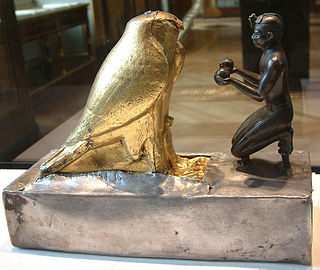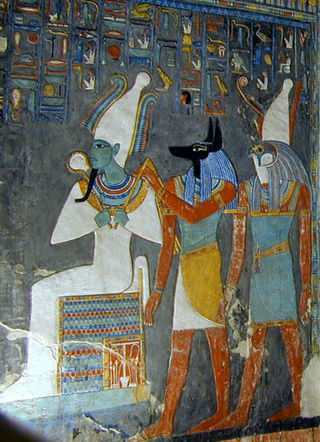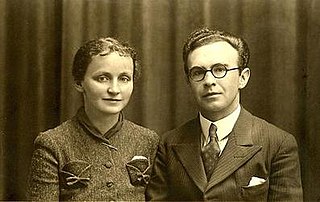John Robert Baines, FBA (born 17 March 1946) is a retired British Egyptologist and academic. From 1976 to 2013, he was Professor of Egyptology at the University of Oxford and a fellow of The Queen's College, Oxford. [1]
John Robert Baines, FBA (born 17 March 1946) is a retired British Egyptologist and academic. From 1976 to 2013, he was Professor of Egyptology at the University of Oxford and a fellow of The Queen's College, Oxford. [1]
Baines was born on 17 March 1946. He is the oldest son of Edward Russell Baines and his wife Dora Margaret Jean (née O’Brien). He was educated at Winchester College, an all boys public boarding school in Winchester, Hampshire, England. [2] He went on to study Egyptology at the University of Oxford. [3] He graduated with a Bachelor of Arts degree (BA) in 1967, later promoted to Master of Arts (MA). He earned his Doctor of Philosophy degree (DPhil) in 1976. [2]
Baines was Professor of Egyptology at the University of Oxford from 1976 to 2013. [1] He was one of the youngest professors at the university at the age of 30. He retired from full-time academia in 2013 but maintains his link with Oxford as a research associate. [1]
Baines is the author of multiple scholarly articles and publications relating to Ancient Egypt. His research interests are in Ancient Egyptian art, religion, literature, and biographies; modelling ancient Egyptian society; comparative and anthropological approaches to ancient civilizations.
In 2011, he was elected a Fellow of the British Academy (FBA), the United Kingdom's national academy for the humanities and social sciences. [4]

Hemen is a falcon god in the Ancient Egyptian religion

Sir Alan Henderson Gardiner, was an English Egyptologist, linguist, philologist, and independent scholar. He is regarded as one of the premier Egyptologists of the early and mid-20th century.
John Barton is a British Anglican priest and biblical scholar. From 1991 to 2014, he was the Oriel and Laing Professor of the Interpretation of Holy Scripture at the University of Oxford and a Fellow of Oriel College. In addition to his academic career, he has been an ordained and serving priest in the Church of England since 1973.
The Griffith Institute is an Egyptological institution based in the Griffith Wing of the Sackler Library and is part of the Faculty of Oriental Studies, University of Oxford, England. It was founded for the advancement of Egyptology and Ancient Near Eastern Studies by the first Professor of Egyptology at the University of Oxford, Francis Llewellyn Griffith. Griffith bequeathed funds in his will for the foundation of the Institute and it opened on 21 January 1939, with its own independent committee of management. Rosalind Moss operated the Griffith Institute from its opening until the mid-1960s.
Stephen Ranulph Kingdon Glanville, was an English historian and egyptologist. He was Edwards Professor of Egyptology at University College London from 1935 to 1946. He was then Sir Herbert Thompson Professor of Egyptology at the University of Cambridge from 1946 until his death in 1956, and additionally Provost of King's College, Cambridge from 1954.
Barry John Kemp, is an English archaeologist and Egyptologist. He is Professor Emeritus of Egyptology at the University of Cambridge and directing excavations at Amarna in Egypt. His widely renowned book Ancient Egypt: Anatomy of a Civilisation is a core text of Egyptology and many Ancient History courses.

Ancient Egyptian deities are the gods and goddesses worshipped in ancient Egypt. The beliefs and rituals surrounding these gods formed the core of ancient Egyptian religion, which emerged sometime in prehistory. Deities represented natural forces and phenomena, and the Egyptians supported and appeased them through offerings and rituals so that these forces would continue to function according to maat, or divine order. After the founding of the Egyptian state around 3100 BC, the authority to perform these tasks was controlled by the pharaoh, who claimed to be the gods' representative and managed the temples where the rituals were carried out.

John Gwyn Griffiths was a Welsh poet, Egyptologist and nationalist political activist who spent the largest span of his career lecturing at Swansea University.
Aylward Manley Blackman, FBA was a British Egyptologist, who excavated various sites in Egypt and Nubia, notably Buhen and Meir. Having taught at Worcester College, Oxford, he was Brunner Professor of Egyptology at the University of Liverpool from 1934 to 1948. He was additionally a special lecturer at the University of Manchester, and was involved in or led a number of excavations with the Egypt Exploration Society.
Ricardo Augusto Caminos was an Argentine Egyptologist focused on epigraphy and paleography. Caminos was born in Buenos Aires and had a brother Hugo and sister Helena. As a child he was fascinated by ancient history, and went on to obtain his undergraduate degree and M.A. (1938) from the University of Buenos Aires. After studying for PhD's from both Oxford University and the University of Chicago's Oriental Institute, Chicago, he worked on number of Egyptian and Sudanese excavations, including those about to be flooded by the construction on the Aswan Dam. Around 1952 he was hired by Brown University, and in 1972 he became the chairman of the Egyptology department, retiring in 1980. He then moved to London where he conducted research at the nearby Egypt Exploration Society. His former home in London now serves as the Ricardo A. Caminos Memorial Library of the Egypt Exploration Society, and contains approximately 20,000 books, journals, and pamphlets on Egyptology.
Erik Hornung was a Latvian Egyptologist and one of the most influential modern writers on ancient Egyptian religion. He was professor emeritus of Basel University.
John David Ray is a British Egyptologist and academic. He is the current Sir Herbert Thompson Professor of Egyptology at the University of Cambridge. His principal field of interest covers the Late and Hellenistic periods of Egypt, with special reference to documents in the demotic script, and he is also known for deciphering the Carian script, a writing system used by Anatolian mercenaries who fought for the late-period Egyptians.

Richard Bruce Parkinson is a British Egyptologist and academic. He is Professor of Egyptology at the University of Oxford and a fellow of The Queen's College, Oxford. Until December 2013 he was a curator in the Department of Ancient Egypt and Sudan, British Museum.

Johann Christoph "Jan" Assmann is a German Egyptologist.
Donald Andrew Frank Moore Russell, was a British classicist and academic. He was Professor of Classical Literature at the University of Oxford between 1985 and 1988, and a fellow and tutor of classics at St John's College, Oxford, from 1948 to 1988: he was an emeritus professor and emeritus fellow. Russell died in February 2020 at the age of 99.
Rosalind Louisa Beaufort Moss, FSA was a British Egyptologist and bibliographer, noted for her work on The Topographical Bibliography of Ancient Egyptian Hieroglyphic Texts, Reliefs and Paintings.
Peter John Parsons, was a British classicist and academic specialising in papyrology. He was Regius Professor of Greek at the University of Oxford from 1989 to 2003.
Christina Riggs is a British-American historian, academic, and former museum curator. She specializes in the history of archaeology, history of photography, and ancient Egyptian art, and her recent work has concentrated on the history, politics, and contemporary legacy of the 1922 discovery of Tutankahmun's tomb. Since 2019, she has been Professor of the History of Visual Culture at Durham University. She is also a former Fellow of All Souls College, Oxford. The author of several academic books, Riggs also writes on ancient Egyptian themes for a wider audience. Her most recent books include Ancient Egyptian Magic: A Hands-On Guide and Treasured: How Tutankhamun Shaped a Century.
Henry Sidney "Harry" Smith, is a British Egyptologist and academic, specialising in epigraphy and Egyptian archaeology. He held the Edwards Chair of Egyptology at University College London from 1970 to 1986. He had previously been a lecturer in Egyptology at the University of Cambridge, where he was also Budge Fellow in Egyptology at Christ's College, Cambridge.
Samuel N. C. Lieu is a historian of Manichaeism and Christianity in Central Asia and China.
{{cite web}}: Missing or empty |url= (help){{cite web}}: Missing or empty |url= (help)